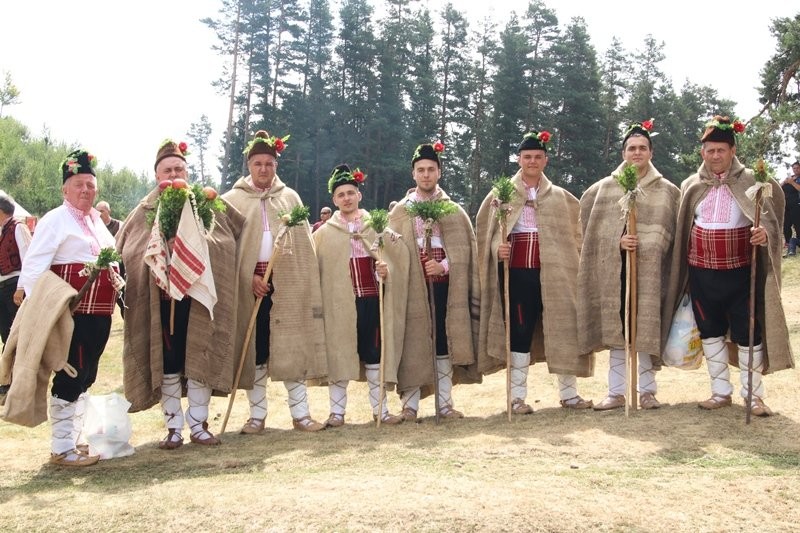Celebrating Christmas is one of the most important and most awaited days of the year. After the hard work of harvesting in the autumn and the preparation for the cold winter, the short and dark days of December seem to brighten with the festive preparations for Christmas.
The festivity surrounding Christ’s Nativity are a time of year that Bulgarians prefer to spend at home, near the hearth and family. Mandatorily, the home must be decorated with a Christmas tree, and tradition dictates that on Christmas Eve every Bulgarian home smells of bread and incense. It is a magical time of year when people believe that miracles happen, and with a song and calls for health, fertility and good luck, groups of the so-called “koledari” (carol singers) go from house to house.
The tradition of “koleduvane” (Christmas caroling) is still very much alive and has its enthusiastic continuers in many places in the country. Proof of this is the male caroling group from the village of Pirgovo near Ruse, a small settlement nestled amidst the high banks of the Danube River. Local residents proudly tell us about their unique Christmas ritual, which deserves special attention.
From time immemorial, the residents of the village of Pirgovo have been living with hard work and great affection for everything they plant and build. Nice vineyards, spacious gardens and sturdy houses and apiaries. The preparation for Christmas in the village starts from Ignazhden (the Day of Saint Ignatius), when according to popular belief and as it is sung in the songs, "The Mother of God struggled to give birth to a young God".
In the morning before Christmas Eve, women from the village of Pirgovo gather to decorate the so-called fir tree, which is a main attribute of the local carol group. It will be carried by the king, as they call the leader of the koledari (carolers) here. The Christmas tree for the carolers in the village of Pirgovo is prepared from boxwood stalks fixed on a wooden base, and red apples are placed on top of it for health.

Below them are the cows, baked in the shape of the fold in which the herd is gathered. The Christmas kravai (round bun) here is given for good luck, which the carolers must invoke with blessing and song in every home. The decorated fir-tree is burned with incense by the women and only then can it be handed over to the carolers. The ritual cow for carolers is also involved in the home, which in Pirgovo resembles the sun, a symbol of the light that gives life and strength to every earthly creature. On top of the sun-bread symbols such as a vine with grapes, chickens and an ear of wheat are placed.
Before daylight, the owner of the home in Pirgovo had to go to the forest to cut down a thick log to light at home and burn on Christmas night. This log in Bulgarian lands is called “badnik” and is another symbol of the new sun, which in Bulgarian tradition is born at Christmas.
However, our breath is taken away by the lyrics of a song performed by the carol group of the village of Pirgovo. No matter how diverse the carol repertoire is in the Bulgarian lands, we have never heard a similar song anywhere. It tells the story of a Bulgarian hero who died in the Battle of Kosovo Field - a tragic episode of the Ottoman invasion of the Balkans. The battle was reached after in 1385 the Ottomans conquered Sofia and reached the borders of the Moravian Principality along the Morava River. No one remembers who first sang this song in the village of Pirgovo, but all the men there know and sing the text, because it is passed down as a legacy from generation to generation.
"It's an old men's song, it's different in that it's performed specifically for the girl in the family we're visiting, and the song is historically based.
"Each song is specific for a member of the family, one is for the host, for the maid, for the hostess”, continues Miroslav Yanakiev. “The king of the group says the blessing for the home, then the bread is given and he is also blessed by the carolers”.

But in the group everyone is important, this is a mass custom, not an individual one. There are currently 9 people in the group, boys and men between 16 and 64 years old. The good thing is that there is continuity. Young people like it, it can only make us happy. When Christmas approaches, we gather and go around the whole village. The hope is that there are many young people and children in Pirgovo, because it is close to the city of Ruse and our village is alive, a rich cultural activity is developing, there are many folk ensembles. So, our caroling group gets younger every year, our songs are sung, and we will be able to preserve the tradition for many years to come in an authentic form."
Clocks and bells will ring out in the center of Stara Zagora on Saturday, when the city will host the XXIV Masquerade Games Festival . The event will start with a traditional parade of participants. Attractive babugers, araps, old men and other..
Today marks the 88th anniversary of the birth of remarkable Bulgaria folk singer Nadka Karadzhova . Born on March 14, 1937 in the then Pazardzhik village of Trivoditsi (today - Plovdiv region), she is a descendant of an old musical family. At the age..
Every year, the chitalishte (community culture club) in the village of Kralevo not far from Targovishte, re-enacts Bulgarian traditions and rituals, organizing contests such as “Master lyutenitsa - maker” and “From granny’s dresser”. And for the..

+359 2 9336 661
